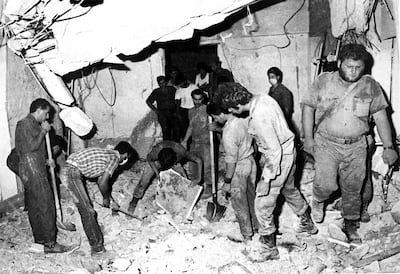Lebanese Prime Minister Nawaf Salam has requested the new Syrian government's help in handing over suspects linked to bombings in Lebanon, including the assassination of President-elect Bachir Gemayel in 1982.
Speaking on his first visit to neighbouring Syria since he became Prime Minister in January, Mr Salam said Lebanon also sought those behind the deadly 2013 bombing of two mosques in the city of Tripoli and “other crimes for which the Assad regime is accused”.
The dictator Bashar Al Assad was toppled in December after a rebel offensive led by forces headed by Syria's new President, Ahmad Al Shara. While no one formally claimed responsibility for the Tripoli bombing, locals blamed operatives working on behalf of the Assad regime.
Habib Shartouni, a member of the Syrian Social Nationalist Party, confessed to the killing of Mr Gemayel in 1982 and was detained in Lebanon days after. He spent eight years in prison before being freed in 1990 as Syrian troops advanced on Beirut. In 2017 he was sentenced to death in absentia by a Lebanese court.

His whereabouts remain unknown, but he has admitted living in Syria from 1994 to 2004. Mr Salam, speaking after meeting Mr Al Shara, said the aim of his visit was to “open a new page in the history of relations between the two countries based on mutual respect … and non-interference in each other's internal affairs”.
Missing prisoners
Mr Salam also raised the issue of the hundreds of Lebanese who went missing in Syria's prison system during the more than 50 years the Assad family ruled in Damascus. He was accompanied by his defence, interior and foreign ministers.
The two men also spoke about “border and crossing control, preventing smuggling and ultimately demarcating the land and sea borders”. The talks were also expected to touch on the contentious issue of the roughly 1.5 million Syrian refugees in Lebanon. The country, home to one of the world's biggest refugee populations, has sought a comprehensive resolution to the issue of refugee returns.

Beirut has long argued that, especially given the economic crisis in Lebanon, it is unable to deal with more than a million Syrian refugees. With the fall of the Assad regime, those calls have grown louder.
Mr Salam's predecessor Najib Mikati visited Syria in January to discuss the problem of smuggling with the new leadership in Damascus – around a month before deadly clashes broke out between armed factions on the porous Syria-Lebanon border. Those clashes have ended and a ceasefire has been agreed, but the border has yet to be demarcated.
Mr Mikati's trip in January was the first visit by a Lebanese head of government to Damascus since Syria's civil war erupted. In December, Mr Al Shara said his country would not negatively interfere in Lebanon and would respect its neighbour's sovereignty.
The country's defence ministers met in Saudi Arabia last month, where an agreement was signed by both sides to demarcate the border and form “legal and specialised committees”. They had been due to meet in Damascus but the meeting was postponed as Syria appointed a new government. The Lebanese President Joseph Aoun also met Mr Al Shara last month in Cairo where they agreed to better secure the border between the two countries.

